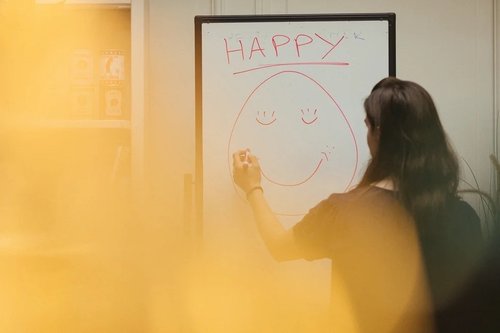Where does the Material Girl fit into the modern workplace?
Aug 07, 2023
8 mins


US community manager and film enthusiast
In this second part of our series on 1980s popular cinema, we examine the rise of materialism, the promise of spiritual fulfillment at work, and what the future of work looks like on screen. Film critic Adam Nayman, who writes for Cinema Scope magazine and The Ringer, and Dr Benjamin Halligan, who has researched and written extensively on film, TV and the media, continue to examine the changes in American popular cinema in the 1980s.
The films of the 1980s make moral corruption seductive by dangling a large carrot in front of audiences. What was the carrot? A combination of luxury, extravagance, and success. In other words: materialism. According to Halligan, the idea of the time was that “if you work hard, if you give your mind to the nine to five, and whatever other extra hours you’ll need to implement the ‘Greed is good’ mantra [as featured in the 1987 movie Wall Street], then what you get is what your parents never had … an amazing flat, you have a Jacuzzi. You’re in a secular age. So you’re not beholden to the moral structure of the church, what you should or shouldn’t do. You can immerse yourself in hedonism, take drugs, maybe occasionally go to the gym.”
Clothes become important indicators of material success in 1980s films. They function not only as a goal, but as a ticket to another world. In The Secret of My Success, Michael J Fox’s character’s transformation from the lowly Brantley Foster into Carlton Whitfield can be realized only through a change of clothes. He takes off his working-class uniform to sport a corporate one: luxe gray suits, ties, and crisp white shirts. This tells audiences that corporate identity is made through the conspicuous consumption of the right clothes and products.
The transformation cliché
This is why the ugly-to-pretty transformation cliché in films about women must include new clothes and a makeover. In both Pretty Woman (1990) and Working Girl (1989), the female protagonists are not just transformed by clothes into appropriate objects of desire, but respectable ones. This is because, in the 1980s, women were expected not only to succeed in the boardroom but to have traditional aspirations of romance; they should act like a man, while staying desirable to men. Nothing better embodies this than the classic line in Working Girl delivered by Melanie Griffith’s character Tess, “I have a head for business and a bod for sin.”
Nayman says, “What’s so regressive about Working Girl and Baby Boom (1987) is, if you compare [them] to similarly plotted movies from the 30s, the 30s movies allow for the possibility that these women are just clever and cunning, and chasing pleasure. They’re not moral paragons.” Halligan points out that in Working Girl we can see how women are expected to accrue “erotic capital,” a term coined by Catherine Hakim, a sociologist who specializes in women’s employment and women’s issues. “The female worker must present herself in an attractive fashion, must be flirtatious, must use all of these advantages in order to get on in life,” he says.
This created a trap for women: be appealing to men at work but never too provocative. Given this expectation that women fulfill both traditional and modern roles in the workplace, it’s hardly surprising that McKinsey’s Women in the Workplace 2022 Report found that women are still “drastically underrepresented in leadership roles” and current women leaders are “leaving their companies at the highest rate in years.” It’s been 35 years since Working Girl, but this report found that women are “more likely to experience belittling microaggressions, such as having their judgment questioned or being mistaken for someone more junior.”
The new promise: spiritual fulfillment through corporate work
In the 1980s, more and more women chose to enter the workplace, rather than be stay-at-home wives and mothers. The prevailing belief was not only that the office could give women more economic power, but also a sense of purpose.
Yet, in the fine print, this promise was limited in inclusion. People of color, and the LGBTQI community are conspicuously absent. Even for white women, the promise of finding meaning and economic liberation by climbing the corporate ladder is tentative at best, and duplicitous at worst.
The year before Working Girl came out, Hollywood released a film that laid bare men’s fear and economic anxiety about women entering the workforce. In Fatal Attraction (1988), Glenn Close plays Alex Forrest, a single, working woman, whose loneliness and bad treatment by men turns Forrest into a zombie-like monster who must be shot dead by housewives everywhere. There was a clear message: Hollywood wanted to turn back time and protect traditional family dynamics.
Paradoxically, Hollywood was also trying to sell white women the idea that they could achieve the working dream. The 1980s launched with a catchy homage to the commute sung by Dolly Parton in the opening credit sequence of Nine to Five (1980). It introduced a decade where working was not just an activity, but a way of life.
In the 1980s, “Hollywood seemed to be tentatively advancing another argument, which is a more sophisticated culture of work where people work in different ways, where workers could be women … and work [could be] fun, not hardship. Work being sociable. Work being somewhere where decency can occur and thrive,” says Halligan.
In Nine to Five, Lily Tomlin’s character Violet is passed over for a promotion in favor of a man. She, Doralee (Dolly Parton), and Judy (Jane Fonda) then decide to stand up to their creepy, sexist boss, Franklin Hart (Dabney Coleman). They physically confine him at home and then are able to bring color into their once-gray office. They implement workers’ programs: including gender-equal pay, flexible hours, and an in-office day care center to reduce absenteeism thus showing again that the workplace is a reformable system, as long as there are benevolent rulers. The happy ending for Fonda’s character is marriage (a man – check), and Tomlin’s is to be promoted to vice president of the company (girl boss – check), while Parton’s heads home to Tennessee to be a singer.
It’s the same in Baby Boom (1987), where Diane Keaton plays JC Wiatt, a high-powered career woman, whose relative dies suddenly, leaving her the legal guardian of a baby. The baby causes her to lose her boyfriend and, more importantly, her job. She moves to Vermont, and instead of finding joy in motherhood or simply exiting the rat race, she finds salvation by starting a luxury baby food business. This business becomes so successful she is able to later reject a buyout from her old boss and company in favor of being her own chief executive. Both Violet in Nine to Five and JC in Baby Boom can find salvation and happiness only through being the boss of the corporate structure that first oppressed them.
Interestingly, there is also no imagined fulfillment outside of these two choices. In Nine to Five in 1980, women can choose to be either a business success or a traditional married mother, until Baby Boom suggests in 1987 that being a mother is not incompatible with business and personal success.
How have our expectations of work changed?
It seems that 1980s films tried to sell the idea that a sense of deeper fulfillment for women, and workers in general, could only be tied to corporate career advancement. This is dangerous for workers, but convenient for businesses. Overworked and exploited workers who are following their “passion” are less likely to complain.
Before “you could be as miserable as you wanted, and as nasty to other people as you want, but you could be yourself. No one said you must enjoy work, or you must find work fulfilling, which is the mantra of HR departments now, and it’s the entire basis of recruitment and development… Now, you have to smile as well,” says Halligan.
A 2019 Pew Research survey found that 57% of American men and 46% of women say having a job or career they enjoy is essential to having a fulfilling life. Another survey found that 53% of workers with a postgraduate degree see their job or career as central to their overall identity.
This is something Americans are just beginning to reckon with. Terms like “the dream job” proselytize work and sell us the idea that happiness can be achieved only through the lens and the system they provide us. Some people waste years searching for elusive happiness at work, instead of realizing it’s just a means to achieve other meaningful things in life.
Is this the end of the social contract?
So what happens to Millenial and GenZ workers, some of whom are entering the job market while others are in middle management, who are a bit disillusioned by the promises their parents made to them? When looking at wages since the 1970s, growth has been unremarkable compared to productivity growth. Between 1979 and 2020, productivity grew at 61.8%, but workers’ wages grew by only 17.5%. Additionally, while we work longer and harder, the cost of living crisis only highlights the fact that wages do not stretch as far as they did for our parents’ generation. For many workers, this feels like a break in the social contract between employer and employee. Many jobs no longer allow you to afford a good quality of life, yet expectations and demands on workers seem to keep growing. Halligan says, “The Protestant work ethic is a two-way deal. You know, I will give you my hours, 9 to 5 to work, but in return, I need enough money to keep myself warm.”
Look no further than recent current events – the pandemic, the cost of living crisis, stagnant wages – and wonder to yourself how we can continue to work with a smile. Halligan addresses the effect the current economic climate has on minimum wage workers in particular by saying that “everything else goes, loyalty and a belief in work, the ability to smile at the customer. You see it as purely transactional and you see the employer as somebody that will scalp you at the first opportunity.”
You can see these disruptions in the world of work with the great resignation, quiet quitting, and widespread layoffs that show that the tacit social contract between employer and employee has been broken.
Today’s view of work as seen on screen
We can see this change in the emergence of recent films such as Sorry to Bother You (2018) and Parasite (2019), which reflect a deep suspicion and distrust in the work ideas the 1980s established. Nayman hopes that some of the anger young people are feeling now could result in a new form of anti-mainstream and anti-corporate filmmaking. He hopes that, for the future of films, that the “Marvelization” is over. But he adds, “I’m also not a chaos theory person for movies where a butterfly flaps their wings or someone makes a movie about unions and the Empire falls. It’s just you want to see sustained, thoughtful, and principled work.”
There’s a short outtake on Youtube, by documentarian David Hoffman that’s worth watching. On Wall Street in 1979, he asked passersby a few provocative questions. Crowds gather around to stare directly into the camera. This is a world where cameras aren’t ubiquitous and still hold novelty. Hoffman asks a man if he thinks the government has more power than corporations. The man smiles a toothy grin and responds, “If you had asked me that question a few years ago, I would have said ‘No.’ But today, I would say, ‘Definitely, yes.’” Hoffman follows up by asking him how he feels about his job. The man smirks again and replies “Well, if it paid a little more, I think I’d like it better.”
What’s so shocking about looking into these images of the past, is not how different things are, but how similar they are. If the 1980s is a story of society growing up and turning to work for fulfillment and a promise of materialism, maybe the story of this generation is that we are still trying to decide what our story is, and whether we will reject our parents’ ideas of work or live up to them.
Photo: Welcome to the Jungle
Follow Welcome to the Jungle on Facebook on LinkedIn and on Instagram and subscribe to our newsletter to get our latest articles every day!

More inspiration: Our relationship with work

Advice for people pleasers: Breaking free from being “too nice” at work
Do you often say things like, "Yeah, sure, I can do that!" when in fact you don't have the bandwidth to do that? We've got you.
Dec 12, 2024

There’s no place like home: Does relocation hurt productivity?
Relocating often brings homesickness, but it’s part of the journey. Here’s how to embrace the change and make the most of it.
Oct 22, 2024

Should you take your office crush to the next level?
Is an office crush worth the risk, or more damaging to your career and reputation than you think?
Oct 09, 2024

Young workers on unpaid internships: Was it worth it?
While internships build skills and connections, unpaid ones can limit opportunities for those who can't work for free. Is it fair?
Sep 12, 2024

Sleeping less to succeed more: Do CEOs sleep as little as we think?
In today's fast-paced corporate world, a common belief is that successful leaders, particularly CEOs, need less sleep to achieve their goals.
Aug 26, 2024
The newsletter that does the job
Want to keep up with the latest articles? Twice a week you can receive stories, jobs, and tips in your inbox.

Looking for your next job?
Over 200,000 people have found a job with Welcome to the Jungle.
Explore jobs